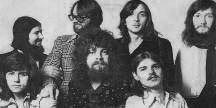|
Electric
Light Orchestra
The
Electric Light Orchestra's ambitious yet irresistible
fusion of Beatlesque pop, classical arrangements, and
futuristic iconography rocketed the group to massive commercial
success throughout the 1970s. ELO was formed in Birmingham,
England in the autumn of 1970 from the ashes of the eccentric
art-pop combo the Move, reuniting frontman Roy Wood with
guitarist/composer Jeff Lynne, bassist Rick Price, and
drummer Bev Bevan; announcing their intentions to "pick
up where 'I Am the Walrus' left off," the quartet
sought to embellish their engagingly melodic rock with
classical flourishes, tapping French horn player Bill
Hunt and violinist Steve Woolam to record their self-titled
debut LP (issued as No Answer in the US). In the months
between the sessions for the album and its eventual release,
the Move embarked on their farewell tour, with Woolam
exiting the ELO lineup prior to the enlistment of violinist
Wilf Gibson, bassist Richard Tandy, and cellists Andy
Craig and Hugh McDowell; despite the lengthy delay, Electric
Light Orchestra sold strongly, buoyed by the success of
the UK Top Ten hit "10538 Overture."
However,
Wood soon left ELO to form Wizzard, taking Hunt and McDowell
with him; Price and Craig were soon out as well, and with
the additions of bassist Michael D'Albuquerque, keyboardist
Richard Tandy, and cellists Mike Edwards and Colin Walker,
Lynne assumed vocal duties, with his Lennonesque tenor
proving the ideal complement to his increasingly sophisticated
melodies. With 1973's ELO II, the group returned to the
Top Ten with their grandiose cover of the Chuck Berry
chestnut "Roll Over Beethoven"; the record was
also their first American hit, with 1974's Eldorado yielding
their first US Top Ten, the lovely "Can't Get It
Out of My Head." Despite Electric Light Orchestra's
commercial success, the band remained relatively faceless;
the lineup changed constantly, with sole mainstays Lynne
and Bevan preferring to let their elaborate stage shows
and omnipresent spaceship imagery instead serve as the
group's public persona. 1975's Face the Music went gold,
generating the hits "Evil Woman" and "Strange
Magic," while the follow-up, A New World Record,
sold five million copies internationally thanks to standouts
like "Telephone Line" and "Livin' Thing."
The
platinum-selling double-LP, Out of the Blue, appeared
in 1977, although the record's success was tempered somewhat
by a lawsuit filed by Electric Light Orchestra against
their former distributor, United Artists, whom the band
charged flooded the market with defective copies of the
album. Columbia distributed the remainder of the group's
output, issued through their own Jet Records imprint,
beginning with 1979's Discovery, which notched the Top
Ten entries "Shine a Little Love" and "Don't
Bring Me Down." In the wake of ELO's best-selling
Greatest Hits compilation, Lynne wrote several songs for
the soundtrack of the Olivia Newton-John film Xanadu,
including the hit title track. The next proper Electric
Light Orchestra album, 1980's Time, generated their final
Top Ten hit, "Hold on Tight." Following 1983's
Secret Messages, Bevan left the group to join Black Sabbath,
although he returned to the fold for 1986's Balance of
Power, which despite the presence of the Top 20 hit "Calling
America" received little interest from fans and media
alike.
However,
as Electric Light Orchestra's career descended, Lynne
emerged as a sought-after producer, helming well-received
comebacks from George Harrison (1987's Cloud Nine) and
Roy Orbison (1989's Mystery Girl) and additionally re-teaming
with both rock legends as well as Bob Dylan and Tom Petty
in the hit supergroup the Traveling Wilburys. Lynne made
his solo debut in 1990 with Armchair Theatre but otherwise
spent the decade out of the limelight, instead producing
material for Joe Cocker, Tom Jones, and Paul McCartney
in addition to working on the Beatles' Anthology project.
In 1988, meanwhile, Bevan formed Electric Light Orchestra
Part II with vocalist Neil Lockwood, keyboardist Eric
Troyer, and bassist Pete Haycock; although Lynne filed
suit against the group (hence the "Part II"
tag), a self-titled LP followed in 1991, with a live collection
recorded with the Moscow Symphony Orchestra appearing
a year later. Outside of 1994's Moment of Truth, subsequent
ELO II releases have been live efforts as well. -- Jason
Ankeny
Source:
AllMusicGuide.com -->
Back
to ElectricLightOrchestra.com
|

